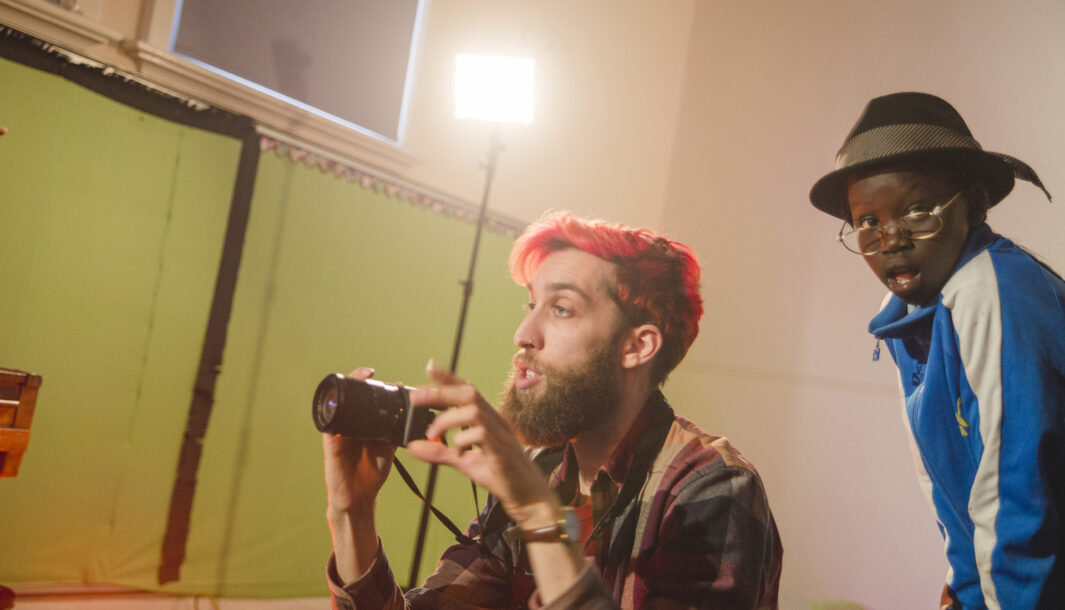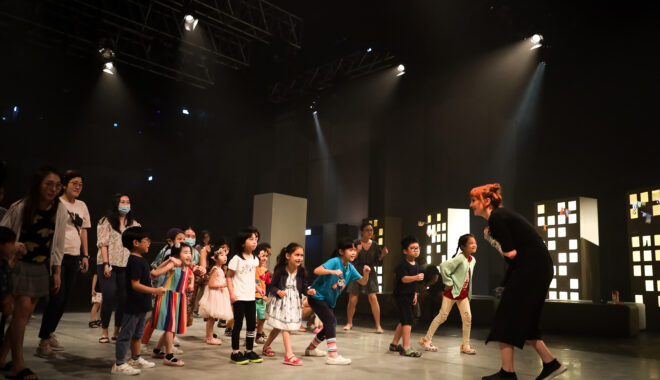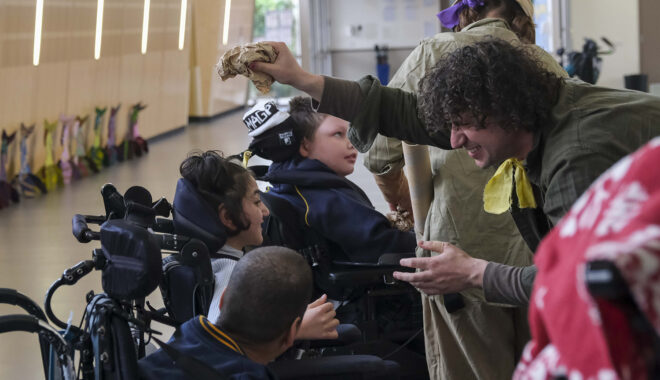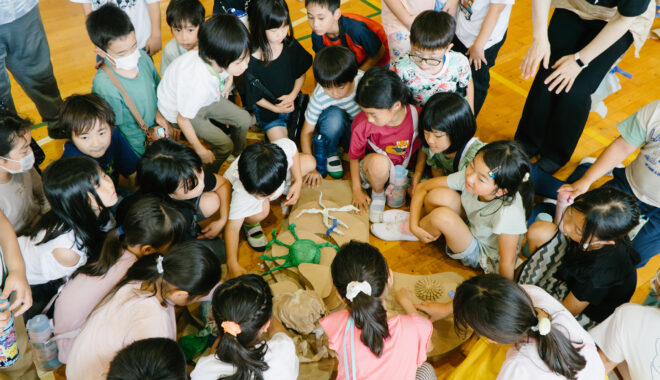8 Feb 2021 Education News
5678 Film Club – finding inspiration

By Dr Meg Upton
Here’s an idea! A frustrated artist accidentally travels through time in a rather bizarre way involving a toilet and a strange character with a moustache…no wait…what about when The Box falls into the wrong hands, a group of young travelers must band together to protect and reclaim its powers. Or, maybe something like…a group of feuding girls unwittingly get stuck in a stairwell together. Can they overcome their differences to find a way out? While the plots may not sound familiar, these are all films, created by students participating in the 5678 Film Club, a three-year project run by Polyglot Theatre supporting young people making the transition between primary and secondary school in Collingwood, Melbourne.
During the project, Polyglot Theatre and a small group of professional filmmakers conducted workshops, mentored, and built a peer network with up to 25 young people who became the co-creators of every aspect of the process, working with Polyglot artists to learn film-making skills and techniques so they could tell their own stories through film. The project included regular screenings at community events, independent film festivals and the big annual red-carpet evening “Collywood” for the whole school community.
I was so happy to be asked to write an education resource for teachers and students in other schools that drew on Polyglot’s child-led creative processes, in this case film making. I needed to know so much more so I asked to join the Polyglot team at St Joseph’s.
It is about 4pm when I arrive at St Joseph’s Primary School in Collingwood on a Wednesday in July 2018. Signing in at the front desk I am directed to the library at the rear of the property and join the 5678 Film Club. The after-school club is preceded by afternoon tea, sharing and shedding the day’s activities and preparing to do some acting, dancing, tell stories and learn about making films. I am warmly welcomed and introduced. I take a seat at the table. It’s loud and chaotic but mostly it’s about eating. I’m here to listen to and learn with these kids, to find out why they want to make films, what films they want to make. Sometime later, in another room, ‘What scares you?’ the group is asked. ‘Nothing’, says Deng. ‘Spiders!’ says Grace. They’ve decided that horror is their genre. Later still, in another room I sit with Harry as he draws a picture of his character, a man who has fled the city after it was overrun by aliens. He’s getting ready to work with his group and a Polyglot team member to scan the picture, upload it, animate it and create a voice. It’s a revelation to them to hear their voices recorded and see their drawings come to life on screen.
What most inspired the creation of a education resource is the many young people I met and spoke with and the films – the amazing films – they made. Quirky, funny, scary, unique, all drawn directly from what they are interested in and the stories they want to tell. Importantly, the project and its process invited young people to play, work and create in and through the arts – film making, drama, script writing, drawing, design, music, multi-media, with some dance along the way. The other inspiration for creating this resource was to advocate for rich education in the arts, to provide ways for students to develop their curiosity, explore possibilities and express these through the arts. This reflects what I believe is the spirit of the 5678 Film Club process, a spirit that aims to centralise young people’s experiences ‘activating their imaginations and empowering young voices’ (Polyglot 2019), as the two quotes below attest to.
“We make films and get to decide what films to make – it’s very fair.” Adol, aged 12.
“I get to be braver in making films and movies,” David, aged 11.
About the resource
The 5678 Film Club education resource is about students making films. It is designed to guide students in years 5 to 8 – with assistance from their teachers – through a rich film making process. It establishes the multi-dimensional nature of film making; film as a medium, as storytelling, as literacy, as entertainment, as collaboration, but importantly as artform. It was initially conceived as a full-term project of two learning sessions per week. It can also be considered as an integrated or cross-disciplinary unit for a year level. However, all learning environments are different so students and teachers can use just some of the activities and adapt them depending on individual learners and school context. The activities are multi-modal and inclusive – everyone has a role to play in film making. The resource is also designed to consider available devices such as smart phones and tablets as well as apps and programs that can be freely downloaded.
Essentially students work in small groups to brainstorm, write, cast, find locations, direct, act in, film, edit, generate a soundtrack if desired, and refine their work. The resource supports this process each step of the way.
What’s in the resource?
Dive in! You can find the 5678 Film Club education resource on Polyglot’s Education Resource webpage. To accompany the resource, members of 5678 Film Club made a film… talking about film making. It’s obvious really. The film is divided into sections, providing great tips about writing, directing, filming, cinematography, editing, and acting, presented by characters ‘Social’ and ‘Media’ in collaboration with Polyglot artists.
Teachers often need to link the work they do with students directly to the curriculum. The education resource suggests links throughout but also provides a detailed table as an appendix, directly connecting to the Australian Curriculum including the disciplines of The Arts, the Capabilities of Literacy, Numeracy, Critical and Creative Thinking, Personal and Social Learning, and Intercultural Understanding.
Film and digital media are very present in young people’s lives. In this resource students are given the opportunity to engage deeply with film and its origins, contemporary film making, explore drama, research, explore script writing, make mini-films, design and produce through a series of structured and guided activities, that draw on a range of stimulus material in order to leap into the unknown.
Why would I use this resource?
2020 demonstrated that change and transition, and the need to build resilience in young people is critical. Building young people’s capacity to meet ongoing challenges can be achieved through learning in the arts. The evidence for rich arts education is compelling. As Sinclair, Jeanneret, O’Toole and Hunter state, ‘Learning in the arts encourages divergent and convergent thinking, and the consideration of multiple solutions to problems. Through consistent engagement, the arts also enable the development of metacognition, self-regulation and self-directed learning, and other cognitive capacities’ (2017, p 33). Such evidenced based research continues to inspire and advocate for the arts. The resource is an open invitation to young people – and their accompanying adults – to consider the power of film making as artform and as a powerful personal and collaborative learning experience.
References
Sinclair C., Jeanneret, N., O’Toole J., and Hunter MA. (2017). Education in the Arts (3rd Ed), Oxford University Press, Australia
Biography
Dr Meg Upton lecturers in drama education, curriculum and pedagogy at Deakin and is an arts education consultant. She worked as education manager at Playbox/Malthouse Theatre and Melbourne Theatre Company and consults widely with other arts organisations including Polyglot, Arena Theatre Company, Arts Centre Melbourne, Tasmania Performs, KAGE, Ilbijerri Theatre and Performing Lines. Meg has written over 100 resources for productions and programs and regularly researches and writes on theatre education and youth arts. She is the author of Education and the Arts: Creativity in the promised new order (with Naomi Edwards), Currency House (2014) and is a Board member of Drama Victoria and of Rawcus Theatre.
The 5678 Film Club education resource is generously supported by the Newsboys Foundation. 5678 Film Club was supported by St Joseph’s Primary School Collingwood, City of Yarra, The Ross Trust and The William Buckland Foundation.







